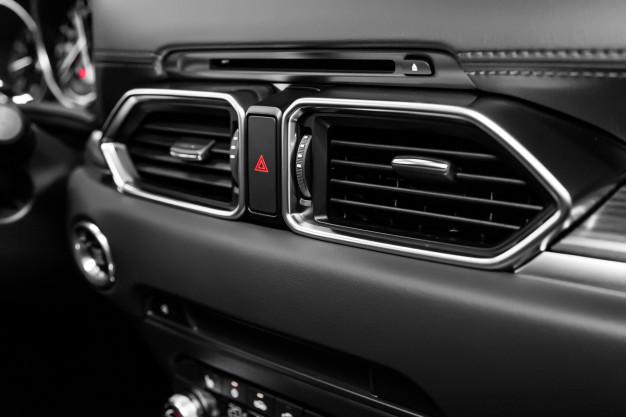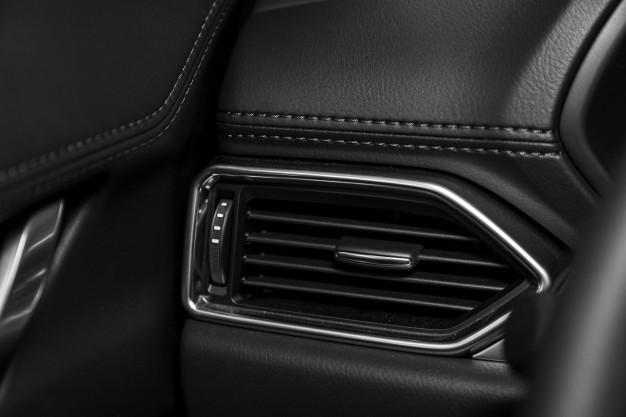How your heater and Air Conditioning A/C Works.
Without the heating and air conditioning systems in today’s modern vehicles, we would all be miserable driving to our destinations. We take for granted the heat that keeps us warm in the winter months, and the cool air that refreshes in the summertime. Let’s take a look at how both systems work to keep us comfortable all year round.
The heater in your car is a smaller version of your cooling systems radiator. Hot engine coolant is circulated through a small radiator, oftentimes called a heater core. A fan is positioned in front of the heater core to blow cold outside air over the fins. As this air travels over the heater core, it heats up and becomes the hot air that blows out your heater vents.
Like your engine cooling system radiator, the heater core can suffer some of the same issues. If the heater core becomes clogged with rust or sludge, you will no longer have heat. Also, leaks can cause a cabin full of white steam and mess up your windows. If you smell the sweet aroma of coolant when your heater is on, chances are, you have a small leak in the heater core. Often the heater core is buried under the dashboard, and replacing it, is a major job.
The air conditioning system in your car is comprised of a compressor, condenser, expansion valve, and evaporator. If you have ever used a can of compressed air to clean computer components, you will know that the bottle gets very cold in a short amount of time. This is due to the rapid expansion of compressed gas. The same thing happens in your car’s air conditioning system. Refrigerant (AKA Freon) is compressed in the compressor and turns into a hot gas. In the condenser, this hot gas is cooled to a liquid state and travels to the expansion valve. As the Freon goes through the expansion valve it returns to a low-pressure gas and rapidly cools in the evaporator. A fan blows over the evaporator and cools the air that eventually blows out your vents. It’s critical to have good procedures and diagrams when troubleshooting your HVAC system, in days past you would grab a printed manual but now they are available online!

Common Problems:
- From time to time the A/C system needs to be recharged to bring it back up to maximum efficiency. Sometimes a leak may cause loss of refrigerant and will need to be fixed before refilling. It’s difficult to tell if a leak is present without specific test equipment so let it up to a professional.
- In recent years, the EPA has phased out the use of R-12 Freon in all refrigeration systems and R-134 has become the new standard. If you have an older system with R-12 you may need to retrofit your system to handle the new R-134 refrigerant. Sometimes seals, hoses, and even the compressor need to be changed. The problem arises when the older seals and hoses are not compatible with the new oils found in the R-134.
- Corrosion will cause the heater core (secondary radiator) to leak. This will manifest itself by leaving steam into the passenger compartment and fogging your windows. You will know there is a leak by the sweet smell coming from your vents. Unfortunately changing the heater core is usually not the easier job in the world as engineers tend to squeeze them into some pretty tight spaces under the dash.
Why Maintaining Your Car’s Heating & Air Conditioning Systems is So Important
With sweltering summer temperatures just around the corner, now is a great time to get your poorly performing air conditioning system repaired before you depend on it to survive even the quickest drives across town. But even if your A/C system seems to be chugging along just fine, it’s still important to schedule regular maintenance—and for your heating system as well.
You probably don’t plan on cranking up the heater for several months, but believe it or not, your car’s heating system is responsible for cooling your car’s engine on hot days, and the A/C system plays a vital role during the colder months as well. Ignoring performance issues can lead to expensive repairs down the line.
Take A Look Below At Two 2 Fun Facts About Your Car’s Heating And Air Conditioning Systems And 3 Important Reasons Why It’s So Crucial To Maintaining Them:
FUN FACT #1: HEATERS KEEP ENGINES COOL.
It might sound strange, but your car’s engine cooling system is directly related to the heating system. Engine friction and combustion produce heat during operation, and while most of it is expelled through the exhaust system, the remaining heat must be dissipated. A mixture of water and antifreeze circulating through the engine block and radiator releases the excess heat into the atmosphere, and on cold days, that heat can also be redirected into the car to provide warmth for you and your passengers. Without a properly functioning heating system, your engine could overheat on a hot summer’s day and—in a worst-case scenario—break down completely.
FUN FACT #2: AIR CONDITIONING HELPS DEFROST WINDSHIELDS.
On chilly winter mornings, when you can see your breath but not through your windshield because of a pesky layer of frost, your air conditioning system is hard at work behind the scenes. By pulling humidity out of the air, the air conditioning system helps defrost and defog the windshield, so if you notice defogging issues on cooler “June gloom” mornings, it might be time to recharge the A/C system or have a mechanic check for leaks and damage.
REASON #1: REGULAR MAINTENANCE KEEPS YOUR HEATING SYSTEM IN GOOD WORKING ORDER.
Unlike the furnace in your house, a car’s heating system does not involve a central heating unit that can be simply replaced. The system is a combination of components including the blower fan, thermostat, and heater core, which is usually located in a difficult to reach area under the dashboard and can take days to repair if minor issues are not immediately addressed. Regular maintenance includes checking hoses and belts, and ensuring the antifreeze is clean and filled to proper levels; it will help keep the whole system in good working order.
REASON #2: REGULAR A/C MAINTENANCE REDUCES RISK OF COMPRESSOR FAILURE.
The compressor is the most important component of your car’s air conditioning system, so it’s no surprise that it’s also the most expensive part to repair or replace. Regular maintenance ensures proper refrigerant and lubrication levels, which reduces the risk of premature compressor failure. Also, the most common air conditioning system problems involve minor issues like blockages or leaks, which are much easier to deal with if caught early during regular maintenance. And as a bonus, regular A/C maintenance can also improve your car’s fuel efficiency, leaving more money in your wallet for summer fun.
REASON #3: HEATING AND A/C SYSTEM MAINTENANCE HELPS KEEP YOU HEALTHY.
As part of any regular maintenance routine for your car’s heating and air conditioning systems, mechanics will check your cabin air filter and replace it if needed. Cabin air filters trap pollen, bacteria, dust, and exhaust fumes before the air reach your dashboard vents and pollutes the air you and your passengers breathe. Dirty or clogged filters can cause a variety of problems, from musty odors to headaches, allergic reactions, or breathing problems from the fumes, so it’s crucial to replace the filter before it gets that bad.

Is running a car’s air conditioner in the winter good or bad?
Some car owners hesitate when it comes to running their car’s air conditioning during the winter months. Not many think it is a good idea to run the a/c when temperatures outside are near freezing and the ground is covered by snow. However, running the a/c in the winter months does not cause any harm to the car’s heating and cooling system. There are many benefits to running the car’s air conditioning in the winter.
Air Conditioning Compressor
The car’s compressor does more than just cool the air before it passed through the car. You can use the a/c compressor while controlling the heat setting of the car to control the climate within. Doing so will help dehumidify the air, reducing fogged up windows. Running the air conditioner will also help clear up window condensation.
Air Conditioning System
Running the air conditioner during the winter will help prevent the car’s cooling system components from wasting away. This helps reduce the loss of refrigerant which occurs when the air conditioning unit is not used for extended periods. It also helps keep up the service life of the vehicle, reducing the need to take the car to a local Longmont auto repair shop for expensive cooling system repairs. Those who opt not to run their air conditioning system during the winter months should make sure they at least run it for 30 minutes once a week. This will help keep the system active and fluids flowing through the a/c compressor.
Air Conditioning Problems
Though the cooling aspect of the air conditioning system will not be used during the winter months, car owners will still be able to catch any major issues. If the air conditioner is not run during the winter, a problem with the system may not be noticed until the summer. This means the car owners could be driving around without air conditioning when the hotter months come around.
Running the air conditioner in a car during the winter months has many different benefits. Those who do so will be able to more efficiently control the temperature and moisture in the car. Plus, they can also protect the cooling system and possibly avoid high repair costs.